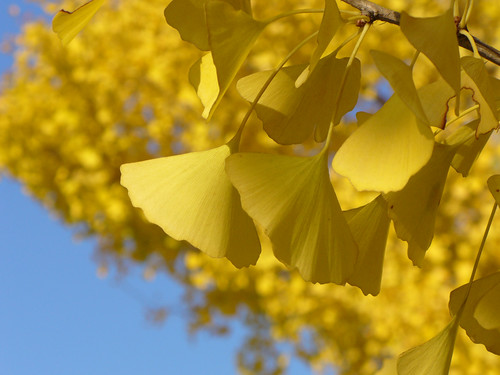 You may recognize the scientific name Ginkgo biloba, even if you haven’t seen the tree it belongs to. Ginkgo extracts can be found in nutritional supplements, shampoos, energy drinks, and many other products.
You may recognize the scientific name Ginkgo biloba, even if you haven’t seen the tree it belongs to. Ginkgo extracts can be found in nutritional supplements, shampoos, energy drinks, and many other products.
Right now is the perfect time to look for the plant itself—its fan-shaped leaves turn bright yellow in fall, and female ginkgo trees drop their smelly fruits.
The ginkgo is one of our most unusual trees. Here’s why:
1. It’s a prehistoric relic. To find the earliest plant that looked like a ginkgo, you’d have to go back over 200 million years. More modern-looking ginkgoes were widespread during the Jurassic period. However, they’d died back to just one region of China by the time the first people walked the planet.
But these days, the ginkgo can once more be found all over the world, because…
2. It tolerates cities well. People like planting it in urban areas because pests generally avoid it, and it’s tolerant of pollution, storms, and compacted soil. You’ll find the ginkgo lining streets all over the world, from Tokyo to New York City.
3. It has unique leaves. The ginkgo is also a popular city tree because of its elegant foliage—its leaves are wedge-shaped, with veins fanning out from a central point. In autumn, they turn a brilliant yellow.
Unlike maples and other colorful fall trees, ginkgoes often drop their leaves within a short period; sometimes most of them fall during a single day. Keep an eye out for this tumbling golden display or watch a short video of it on our Facebook page.
4. It has stinky fruit. In autumn, you may smell a ginkgo before you see one. The female plants produce fruit whose stench has been likened to rotten cheese. This smell is so pungent that many plant nurseries will only sell male plants, which don’t make fruit.
Some scientists suggest that this odor once attracted mammals (or even dinosaurs) that liked spoiled meat. These now-extinct creatures would have eaten the fruit and spread the seeds.
Is there a beautiful—and maybe stinky—ginkgo tree in your neighborhood?
Photo © paddockcafe/flickr


 Efforts to repeal the Massachusetts Endangered Species Act (MESA) are once again underway, and we need your help!
Efforts to repeal the Massachusetts Endangered Species Act (MESA) are once again underway, and we need your help!